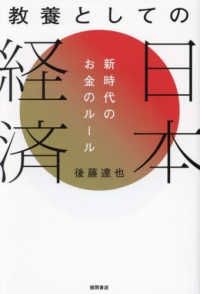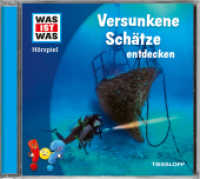- ホーム
- > 洋書
- > 英文書
- > Business / Economics
Full Description
In a world of continuing financial volatility, this book critically evaluates the oft-cited claim that US firms and the US government attempt to open emerging markets in economic distress and acquire valuable industrial and financial assets.
Focusing particularly on Korea and Thailand, the author examines the degree of market opening, the roles US actors played in this process and the level of foreign firm activity in the years after the Asian crisis. Justin Robertson finds surprisingly little coherence between the strategies of US firms and US policy-makers. At the same time, the book downplays European investments, concluding instead that the decade since the Asian crisis has reaffirmed strengths of US capital, particularly in some of the most important sectors of the global economy. Investment banking, private equity and subcontracting are significant new features of US-Asia economic relations.
Providing a sophisticated understanding of US interests in Asia, especially in terms of the politics of finance capital, and including a wealth of empirical data on the US and Asian political economies, this book will be invaluable for students and scholars of international political economy and Asian economics and politics.
Contents
1. Introduction: Opportunism, Resistance and Divergent U.S. Economic Interests in Post-Financial Crisis Asia PART I: Towards a Different Approach 2. The Foreign-Domestic Divide in Studying the Aftermath of Economic Crises and Outlining an Alternative Approach 3. The Divergent U.S. Interests Approach: A Different Theoretical Lens PART II: U.S. Economic Behaviour in Asia After the Financial Crisis 4. An Opportunity for Foreign Investors: Crisis-Induced Market Opening in Korea and Thailand 5. Significant U.S. Interests and Influence in the Market Liberalization Process 6. Limited American and Aggressive Non-American Foreign Investment in Post-Crisis Korea and Thailand PART III: Explaining Divergent U.S. Economic Interests 7. New Forms of International Business in East Asia 8. Misleading Theoretical Models of Economic Crises 9. Conclusion: Reviewing Findings and Looking Outside Asia








